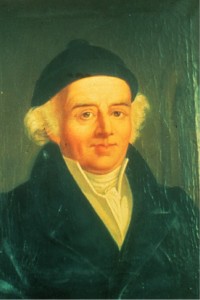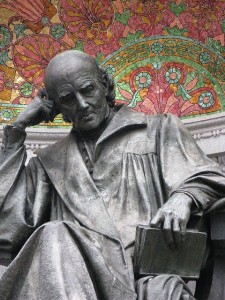“The highest ideal of cure is the rapid, gentle and permanent restoration of health… in the shortest, most reliable, and most harmless way, on easily comprehensible principles.” Samuel Hahnemann, Organon of Medicine
 Homeopathy may be unknown to you. Let me therefore give a few words of explanation. Homeopathy is according to the WHO the second largest medical system used internationally. It is based on the observation that a disease can be healed by a substance that would cause a similar set of symptoms when given to a healthy person. This so called “law of similars” had been discovered in ancient times, but was developed into a systematic healing method by the German physician Dr. Samuel Hahnemann. Through exact clinical observations, Hahnemann also found a way to determine the smallest possible dose that is needed to effectively treat a disease without causing side effects. He reached this goal by further and further diluting his medicines and at the same time exposing them to a process of vigorous shaking, called succussing. Although it is not yet understood how this process enhances the power of a remedy, homeopaths all over the world see their effect daily in their clinics. In addition, there is a lot of well designed clinical studies that have shown homeopathy to be effective in the treatment of a multitude of illnesses.
Homeopathy may be unknown to you. Let me therefore give a few words of explanation. Homeopathy is according to the WHO the second largest medical system used internationally. It is based on the observation that a disease can be healed by a substance that would cause a similar set of symptoms when given to a healthy person. This so called “law of similars” had been discovered in ancient times, but was developed into a systematic healing method by the German physician Dr. Samuel Hahnemann. Through exact clinical observations, Hahnemann also found a way to determine the smallest possible dose that is needed to effectively treat a disease without causing side effects. He reached this goal by further and further diluting his medicines and at the same time exposing them to a process of vigorous shaking, called succussing. Although it is not yet understood how this process enhances the power of a remedy, homeopaths all over the world see their effect daily in their clinics. In addition, there is a lot of well designed clinical studies that have shown homeopathy to be effective in the treatment of a multitude of illnesses.
I was introduced to Homeopathy as a medical student during an internship with a pediatrician in Germany. In his busy practice he treated many children with homeopathic remedies for the usual acute pediatric diseases like earache, colds, fevers, bronchitis or even pneumonia. When they came in a few days later for a follow-up consultation, I could see that they were usually much improved or had completely recovered without the use of any conventional medicines. He also had great success in treating chronic ailments like allergies, eczema, rheumatism and many more. These stunning results motivated me to study homeopathy, first by myself and later in a 3 year postgraduate program for physicians.
 During my residency in a psychiatric hospital, I realized that homeopathy is of amazing value not only in acute, but also in chronic conditions, even in long-standing mental diseases that had not responded to regular medical treatment. While working in a psychiatric day-clinic, I was able to help patients significantly reduce or even go off their medication while continually improving on homeopathic remedies. These personal experiences convinced me that homeopathy is the most gentle and effective medical system I have seen so far. It is no “magic cure” or “just placebo” but rather individually tailored medicine at its best, where the smallest dose possible stimulates the regulatory systems of a patient in the most efficient way.
During my residency in a psychiatric hospital, I realized that homeopathy is of amazing value not only in acute, but also in chronic conditions, even in long-standing mental diseases that had not responded to regular medical treatment. While working in a psychiatric day-clinic, I was able to help patients significantly reduce or even go off their medication while continually improving on homeopathic remedies. These personal experiences convinced me that homeopathy is the most gentle and effective medical system I have seen so far. It is no “magic cure” or “just placebo” but rather individually tailored medicine at its best, where the smallest dose possible stimulates the regulatory systems of a patient in the most efficient way.
Homeopathy can be combined with other therapeutic approaches. I found the combination of homeopathy and psychotherapy especially beneficial for patients with psychosomatic or emotional problems. The addition of homeopathy to psychotherapy often makes the process of working through personal issues much faster and less painful.
I practice Pure Homeopathy, which means that I follow the principles set out by Samuel Hahnemann in book “ The Organon of medicine”. In this book, the foundation of homeopathy, its basic principles and methods are laid out and defined. These are, among others, the principle of similarity, the principle of giving only one remedy at a time and the principle of giving a remedy in the smallest dose possible. My experience is that if you follow these clear guidelines as thoroughly as possible, the healing effect is the greatest.
Which illnesses respond well to homeopathic treatment?
Almost any disease can be cured with homeopathic treatment as long as no substantial structural harm has occurred and the organism is able to react to a remedy. Basically, as long as your body can be stimulated into a healing reaction, homeopathy can help. Even in incurable diseases can homeopathic treatment often reduce pain and greatly enhance life quality.

